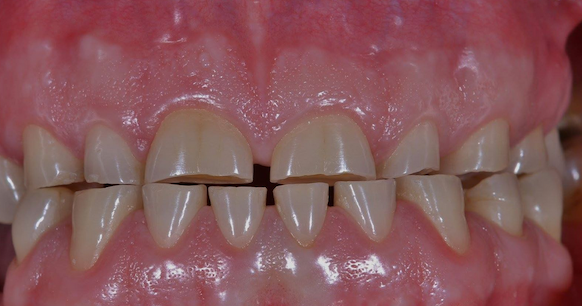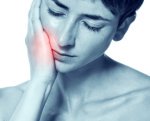Grinding Teeth Symptoms
Grinding teeth symptoms can be unclear and difficult to identify - UNLESS YOU KNOW WHAT TO LOOK FOR.
And grinding teeth symptoms may be different from one person to another.
Grinding teeth at night is very common, much more than you may think.
Although grinding your teeth is something that can happen at any time of day, you get the biggest problems with grinding teeth at night, when you are asleep.
 Woman holding her head after grinding her teeth
Woman holding her head after grinding her teethWhy?
When you are asleep, grinding teeth at night happens with 2 or 3 times the force that is possible when you are awake! That's more than DOUBLE the force.
Lots of parents tell me that they can hear their young children grinding their teeth at night. They can see how the baby teeth get worn down gradually over a couple of years.
But when I point out tooth wear on their adult teeth, patients tend to blame everything else EXCEPT grinding their teeth. They tell me that they chipped their teeth in an accident, or on hard abrasive foods. Most of them don't believe me at first when I tell them that they are grinding teeth at night.

Grinding Teeth Symptoms
What are the grinding teeth symptoms that alert me to tooth grinding?
- First, a history of migraines or stress headaches. The extreme forces that the jaw muscles put into the bones around the face when grinding teeth at night can cause many symptoms.
The typical picture would be waking up in the morning with a headache or a dull pain anywhere in your head. It's also possible to get "stress headaches" and a sore neck from this intense grinding teeth at night.
My page at Migraine Treatment tells you about a treatment that is drug-free AND approved by the FDA as a migraine therapy.
- "Sinusitis". Grinding teeth symptoms frequently include a pain that seems to be sinusitis. Of course, this usually IS sinusitis, but I'm surprised by how many times it turns out to be caused by clenching or grinding your teeth while you are asleep. Read more about this at Sinusitis symptoms.
- Jaw Joint Pain. With all that face muscle clenching, your poor old jaw-joint is also frequently put under pressure! I say " frequently" and not "always" because sometimes people clench their teeth in one position, right on the molars. The jaw joint can usually cope with this.
But it's more of a problem if you slide your jaw off to one side a bit as well as clenching. NOW the jaw-joints are unequally loaded, and one side can start to become uncomfortable. If you are teeth clenching every night, the poor old joint takes a beating! See Jaw Joint Pain for more information.
- Worn down teeth. Especially the eye teeth. These wear facets on upper and lower teeth match up to each other when the patient bites the teeth together and then slides their jaw to one side. It's like a piece of a jigsaw puzzle sliding smoothly into place! This tooth wear is not caused by eating.
There's nothing we eat that's as hard as tooth enamel. The only thing that wears down tooth enamel is the tooth enamel on another tooth!
But it takes a lot of force. It has been shown that, when we are asleep, we can clench our teeth with more than 2 or 3 times the force that is possible when we are awake. More than double. But we usually don't know we are grinding our teeth, because we ARE asleep!
- Grooves or notches on the "necks" of teeth, at gum level. You can get your fingernail in there and feel the "catch". These notches develop if any 2 of 3 things occur.
First, heavy and prolonged tooth grinding at night.
Second, aggressive tooth brushing with a hard-bristled brush along the gum edges.
Third, an acidic environment in the mouth, either from drinking acidic drinks like sodas, or gastric acid reflux.
Any 2 of these together will set the stage for notches to develop! The damage at the tooth neck from grinding teeth is caused by the huge forces exerted on the teeth. The tooth flexes a microscopic amount, actually bending a fraction at the gum edge.
Enamel is very brittle, like porcelain, and where it is thinnest (at gum level) it can splinter off. Over a period of some years, you get a notch developing.
- Small bony bumps under the tongue, on the left and the right. To generate the huge forces at night, the muscles in your jaws and face have to work VERY hard. They get a real work-out!
And so does the bit of bone that the muscle is anchored to. Over a period of some years, this area of bone can become denser and enlarged. Like a muscle, bone reacts to exercise!
- Cracked or broken teeth, sometimes even without any fillings! I'm sure you can imagine, grinding your teeth at night can cause a few chips or cracks in your teeth!
The surprising thing is, it's also possible to crack a tooth right from top to bottom, even a tooth that has never had a filling before. This just goes to prove the forces involved.
- Finally, I can sometimes see an obvious scalloped edge on either side of the tongue. This comes from the tongue being pressed extremely firmly against the inner surfaces of the teeth. The edges of the tongue become indented, mirroring the surfaces of the teeth.
For treatment, have a look at my page on teeth grinding treatment HERE.
As you can see from this list, grinding teeth symptoms are varied, and they don't ALL occur at once!. If somebody only has one or two of the things from this list, then it's not certain that they ARE grinding their teeth at night. But if they have several of the things, then it becomes more of a certainty. Ask your dentist!



